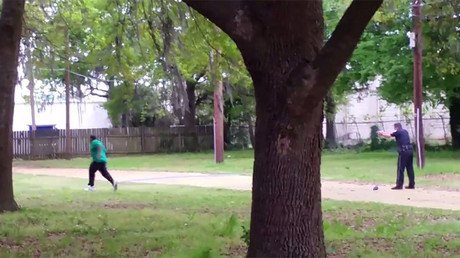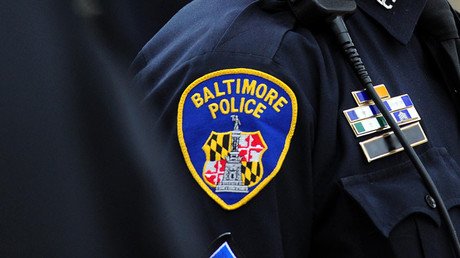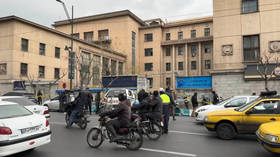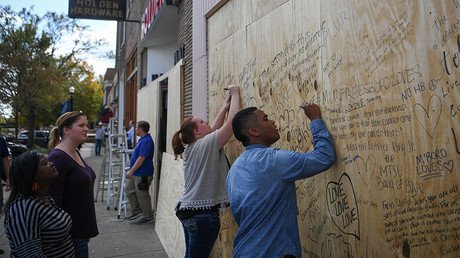New Mexico police repeatedly pulled over ICE agent ‘driving while black’ – ACLU
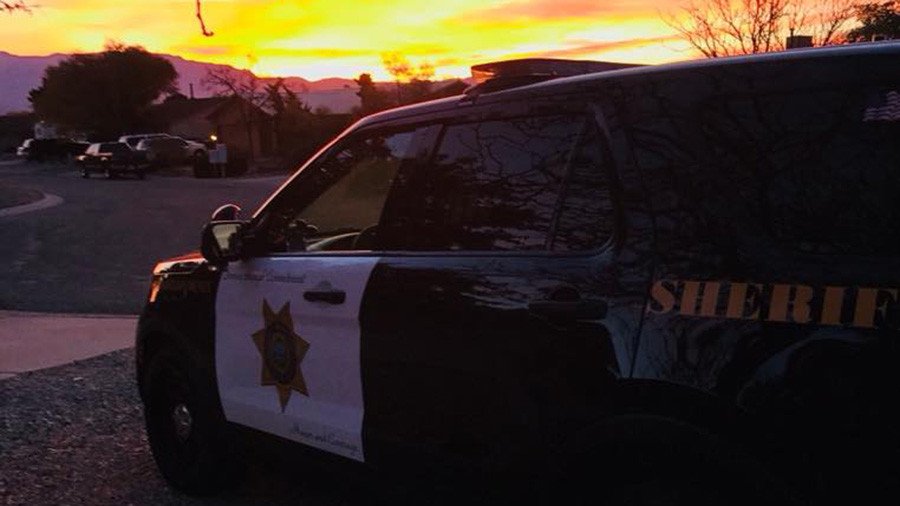
The ACLU has filed a lawsuit on behalf of an immigration deportation officer, who claimed she was racially profiled by New Mexico police. The African-American woman says she was stopped three times in less than a month without probable cause.
The American Civil Liberties Union (ACLU) of New Mexico filed a lawsuit against the Bernalillo County Sheriff’s Office (BCSO) Wednesday, alleging that deputies racially profiled an African-American Immigration and Customs Agent (ICE).
The lawsuit alleges that BCSO deputies targeted Sherese Crawford because of her race, pulling her over three times over the course of 28 days. The ACLU argues that there was “no probable cause or reasonable suspicion that she was breaking the law.”
“Our client is an accomplished federal agent who was targeted for driving while black,” Kristin Greer Love, ACLU of New Mexico Staff Attorney, said in a statement. “Racial discrimination has no place in New Mexico, and BCSO must take immediate action to ensure that this behavior does not continue.”
ACLU sues @BCSDSheriff for #racialprofiling an African-American ICE agent. 3 stops in less than a month--twice by the same deputy--no warnings or tickets. #NMhttps://t.co/W6ojMwi5bMpic.twitter.com/aSIr6U8R31
— ACLU of New Mexico (@ACLUNM) December 6, 2017
On April 5, BCSO Deputy Leonard Armijo stopped Crawford after he ran her license plate, and it came back as a “skip plate,” indicating that the vehicle was stolen.
The ACLU said that this was a “highly unlikely claim,” since Crawford was driving a rental vehicle that ICE provided for her.
After searching her license and rental information, Armijo told Crawford she was free to go.
The lawsuit says that because she was in a rental car, Crawford believed that Armijo “targeted her because of her race.”
Crawford contacted her supervisor in Albuquerque, who advised her that the officer “likely stopped her because she fit a profile,” specifically because she was an African-American woman driving a rental car.
Ten days later, Crawford was stopped again along the same route by an officer who did not identify himself to her. Deputy Patrick Rael said that he stopped Crawford, because she was tailgating, but Crawford said that it would have been impossible for him to observe if she was tailgating from his position.
After Rael asked Crawford for her license and rental information, he asked if “we” had pulled her over previously, recalling a deputy who told him about an ICE officer with an “attitude.” Rael also let Crawford go without a ticket or a warning.
On May 3, Crawford was again stopped by Rael, who again did not identify himself to her. This time, Rael said he pulled Crawford over because she was driving "too slowly.” He let her go without a ticket or a warning again.
Each time the officers stopped Crawford, the ACLU said they wanted to “investigate a different crime for which they did not have reasonable suspicion or probable cause.”
The lawsuit claims that Armijo and Rael said the reason they stopped Crawford was not “necessary for the protection of traffic safety.”
Crawford complained about each of the traffic stops to the BCSO’s Internal Affairs Unit, alleging that she had been racially profiled, but her allegations were not substantiated, according to the lawsuit.
The ACLU argues that since her complaints were not substantiated, the officers were “acting pursuant to Bernalillo County policy.”
“Bernalillo County, by and through its policymakers, must discipline, not encourage or ratify, the unconstitutional conduct of its employees,” the lawsuit reads.
The ACLU argues that the BCSO has adopted “unconstitutional policies” of racial profiling and failed to “train, supervise, and discipline deputies in order to prevent unconstitutional conduct.”
“Bernalillo County must train its deputies that they must have reasonable suspicion and/or probable cause to seize a motorist, the unlawfulness of targeting people for law enforcement stops because of their race, as well as the unlawfulness of pretextual stops,” the lawsuit reads.
Furthermore, the ACLU argues that the County has failed to investigate, discipline, or deter deputies who engaged in unconstitutional misconduct.
“These three incidents taken together clearly show that BCSO has an unconstitutional policy of racial profiling African-Americans,” Laura Schauer Ives, ACLU of New Mexico cooperating attorney, said in a statement. “It is impossible to imagine that these three stops in close succession with no warning or citation were motivated by anything other than our client’s race.”
The ACLU claims Crawford suffered “anguish, embarrassment, emotional injuries, mental injuries, and psychological injuries,” from the traffic stops. They are seeking an unspecified amount in damages on behalf of Crawford and asking for the department to make policy changes “that the court deems necessary” to prevent further racial profiling.
While the federal government allows pretext stops, the New Mexico Constitution provides drivers with greater protections against unreasonable searches and seizures. In a 2005 ruling, the New Mexico Court of Appeals said an officer cannot use a valid traffic stop as pretext to ask any occupant of the vehicle for their ID, according to the New Mexico Department of Public Safety.
According to the BCSO website, Undersheriff Rudy Mora helped develop a “Racial Profiling Policy” for the department.
BCSO denies that Armijo and Rael violated Crawford’s rights, according to the lawsuit.
